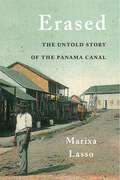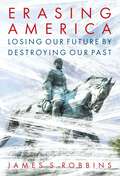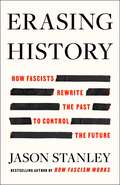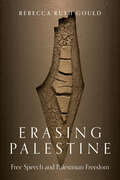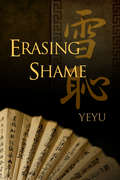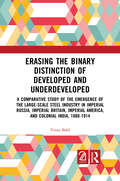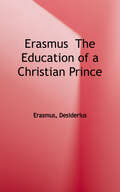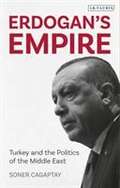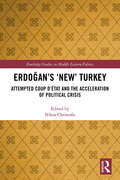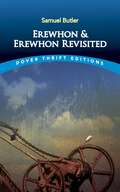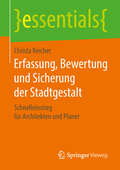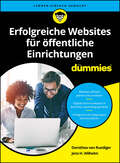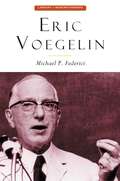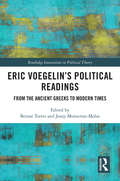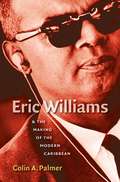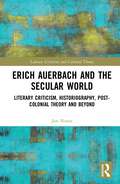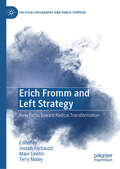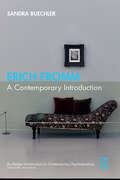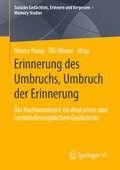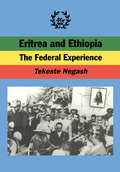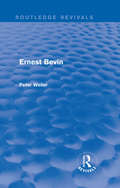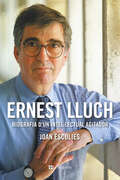- Table View
- List View
Erased: The Untold Story of the Panama Canal
by Marixa LassoCutting a path from the Atlantic to the Pacific, the Panama Canal set a new course for the development of Central America—but at considerable cost to Panamanians. Sleuth and scholar Marixa Lasso recounts how the canal’s American builders displaced 40,000 residents and erased entire towns in the guise of bringing modernity to the tropics.
Erasing America: Losing Our Future by Destroying Our Past
by James S. RobbinsRemember America? There may come a time when no one will. There will be no monuments to American heroes, no stories that will praise them. The United States will have become a dark chapter in human history, best forgotten. In Erasing America: Destroying Our Future by Erasing Our Past (releasing August 21st), James Robbins reveals that the radical Left controls education, the media, and the Democratic party…. and they seek to demean, demolish, and relentlessly attack America’s past in order to control America’s present. This toxic movement has already brainwashed an entire generation and is rapidly changing the cultural, historical, and spiritual bonds of our nation. American exceptionalism, history, and patriotism are a magnificent legacy, Robbins warns, but to pass it on to our children, we must view the past with understanding, the present with gratitude, and the future with hope. Wondering if it’s really that bad? Here are some facts you’ll learn in Erasing America: At Yale, residential Calhoun College is being renamed after students complained about the pro-slavery sentiments of John C. Calhoun. In Massachusetts, Simmons College claims saying, “God bless you” is an “Islamophobic microaggression.” In Virginia, school districts seek to ban To Kill a Mockingbird and The Adventures of Huckleberry Finn because parents complained about the racial slurs in the books. Across the country, Christmas songs and movies are labelled as racist and sexist – and banned. In California, a San Francisco school district wants to rename George Washington High School because our first president owned slaves. In Arkansas, a monument engraved with the Ten Commandments was smashed to smithereens by a protester in a Dodge Dart. And in parks and squares across the South, statues of confederate generals and soldiers are disappearing. Robbins wants you to understand the critical situation in America, and to use Erasing America to equip your fellow Americans against this Leftist propaganda – before it’s too late!
Erasing History: How Fascists Rewrite the Past to Control the Future
by Jason Stanley&“I&’ve never read a book that is as timely, urgent and essential as this one. A battle plan for keeping this nation from falling into fascism.&” —Khalil Gibran Muhammad, author of The Condemnation of Blackness From the bestselling author of How Fascism Works, a searing confrontation with the far right&’s efforts to rewrite history and undo a century of progress on race, gender, sexuality, and class.The human race finds itself again under threat of a rising global fascist movement. In the United States, democracy is under attack by an authoritarian movement that has found fertile ground among the country&’s conservative politicians and voters, but similar movements have found homes in the hearts and minds of people all across the globe. To understand the shape, form, and stakes of this assault, we must go back to extract lessons from our past. Democracy requires a common understanding of reality, a shared view of what has happened, that informs ordinary citizens&’ decisions about what should happen, now and in the future. Authoritarians target this shared understanding, seeking to separate us from our own history to destroy our self-understanding and leave us unmoored, resentful, and confused. By setting us against each other, authoritarians represent themselves as the sole solution. In authoritarian countries, critical examination of those nations&’ history and traditions is discouraged if not an outright danger to those who do it. And it is no accident that local and global institutions of education have become a battleground, the authoritarian right&’s tip of the spear, where learning and efforts to upend a hierarchal status quo can be put to end by coercion and threats of violence. Democracies entrust schools and universities to preserve a common memory of positive change, generated by protests, social movements, and rebellions. The authoritarian right must erase this history, and, along with it, the very practice of critical inquiry that has so often been the engine of future progress. In Erasing History, Yale professor of philosophy Jason Stanley exposes the true danger of the authoritarian right&’s attacks on education, identifies their key tactics and funders, and traces their intellectual roots. He illustrates how fears of a fascist future have metastasized, from hypothetical threat to present reality. And he shows that hearts and minds are won in our schools and universities—places, he explains, that democratic societies across the world are now ill-prepared to defend against the fascist assault currently underway. Deeply informed and urgently needed, Erasing History is a global call to action for those who wish to preserve democracy—in America and abroad—before it is too late.
Erasing Palestine: Free Speech and Palestinian Freedom
by Rebecca GouldHow the redefinition of antisemitism has functioned as a tactic to undermine Palestine solidarityThe widespread adoption of the IHRA definition of anti-semitism and the internalisation of its norms has set in motion a simplistic definitional logic for dealing with social problems that has impoverished discussions of racism and prejudice more generally, across Britain and beyond. It has encouraged a focus on words over substance.Erasing Palestine tells the story of how this has happened, with a focus on internal politics within Britain over the course of the past several years. In order to do so, it tells a much longer story, about the history of antisemitism since the beginning of the twentieth century. This is also a story about Palestine, a chronicle of the erasure of the violence against the Palestinian people, and a story about free speech, and why it matters to Palestinian freedom.
Erasing Shame
by Yeyu2nd EditionThe son of a Han traitor who had let the Xianbei Mongols invade the borders, Jiang Shicai swears to restore his family's honor, hoping to better the Hans' lives through peaceful means. He believes violence is never the answer, but to gain respect, he finds himself fighting for the Xianbei. Ten years later, an annoying but handsome playboy, Dugu Xuechi, arrives as the incompetent new military inspector of Shicai's region. Shameless, irresponsible, and obnoxious, Xuechi tests Shicai's patience almost every second. Despite their mutual dislike, Shicai finds himself drawn to the capricious man, especially when he sees the resemblance between Xuechi and his deceased best friend. Yet Xuechi's self-destructive behavior and refusal to accept help require attention that distracts Shicai from his goal for peace--and it doesn't help that Xuechi is Shicai's strongest political opposition. Haunted by a childhood promise he never had the chance to fulfill, Shicai must choose between his feelings and his values.First Edition published by Dreamspinner Press, February 2013.
Erasing the Binary Distinction of Developed and Underdeveloped: A Comparative Study of the Emergence of the Large-Scale Steel Industry in Imperial Russia, Imperial Britain, Imperial America, and Colonial India, 1880-1914
by Vinay BahlThis book challenges the binary distinction of developed and underdeveloped in the categorization of any country while proposing to erase this binary with a yardstick of parity. Through a sample comparative historical study focusing on the question of the emergence of the large-scale steel industry (1880-1914) of four chosen countries, two considered "developed" (Imperial UK and Post-colonial Imperial USA) and two considered "underdeveloped" (Imperial Russia and Colonial India), it is shown how this yardstick of parity can be applied without the categorization of societies as either developed or underdeveloped. Print edition not for sale in South Asia (India, Sri Lanka, Nepal, Bangladesh, Pakistan or Bhutan)
Erasmus: The Education of a Christian Prince (Cambridge Texts in the History of Political Thought Ser.)
by Desiderius ErasmusThe Education of a Christian Prince is a new student edition of Erasmus's crucial treatise on political theory. It contains a new, excerpted translation from his Panegyric, making it possible for the first time to compare two works which Erasmus himself regarded as closely related. The Education of a Christian Prince was published in 1516 and dedicated to Prince Charles, the future Emperor Charles V, and is one of the most influential books of the 'advice-to-princes' published in the Renaissance era. It is a strongly pacifist work in which Erasmus sought to ensure that the prince governed justly and benevolently. The importance of Erasmus's work lies in his emphasis on virtuous conduct as the backbone of the polity, an argument which has influenced political writing up to the present time. This edition also includes an original introduction, a chronology of the life and work of Erasmus, and a comprehensive guide to further reading.
Erdogan's Empire: Turkey And The Politics Of The Middle East
by Soner CagaptayGradually since 2003, Turkey's autocratic leader Recep Tayyip Erdogan has sought to make Turkey a great power -- in the tradition of past Turkish leaders from the late Ottoman sultans to Ataturk, the founder of modern Turkey. Here the leading authority Soner Cagaptay, author of The New Sultan -- the first biography of President Erdogan -- provides a masterful overview of the power politics in the Middle East and Turkey's place in it. <p><p> Erdogan has picked an unorthodox model in the context of recent Turkish history, attempting to cast his country as a stand-alone Middle Eastern power. In doing so Turkey has broken ranks with its traditional Western allies, including the United States and has embraced an imperial-style foreign policy which has aimed to restore Turkey's Ottoman-era reach into the Arabian Middle East and the Balkans. <p> Today, in addition to a domestic crackdown on dissent and journalistic freedoms, driven by Erdogan's style of governance, Turkey faces a hostile world. Ankara has nearly no friends left in the Middle East, and it faces a threat from resurgent historic adversaries: Russia and Iran. Furthermore, Turkey cannot rely on the unconditional support of its traditional Western allies. Can Erdogan deliver Turkey back to safety? What are the risks that lie ahead for him, and his country? How can Turkey truly become a great power, fulfilling a dream shared by many Turks, the sultans, Ataturk, and Erdogan himself?
Erdoğan’s ‘New’ Turkey: Attempted Coup d’état and the Acceleration of Political Crisis (Routledge Studies in Middle Eastern Politics)
by Nikos ChristofisDemonstrating how Turkey’s politics have developed, this book focuses on the causes and consequences of the failed coup d'état of 15 July 2016. The momentous event and its aftermath challenges us to ask if the coup was the cause of Turkey’s present crisis, or simply an accelerant of trends already in motion, and thus a catalyst for the realization of Erdoğan’s latent authoritarian impulses. Bringing together approaches from politics, sociology, history and anthropology, the chapters shed much-needed light on these crucial questions. They offer scholars and nonspecialists alike a comprehensive overview of the implications of the coup attempt and its aftermath on the issues of religion, democracy, the Kurds, the state, resistance and more besides. Its effects have been felt in almost every aspect of Turkish society from religion to politics, yet it came at a time when Turkey was already experiencing significant social and political turmoil under the increasingly authoritarian leadership of President Recep Tayyip Erdoğan. Readers interested in contemporary politics, Turkish and Middle Eastern studies will find the volume useful, as they ponder other cases in this era of democratic retrenchment and global turmoil.
Erewhon and Erewhon Revisited: Both By The Original Discoverer Of The Country And By His Son (Dover Thrift Editions: SciFi/Fantasy)
by Samuel ButlerIn Erewhon, an anagram for "nowhere," sickness is a punishable crime, criminals receive compassionate medical treatment, and machines are banned, lest they evolve and take over. Originally published in 1872, the proto-steampunk novel Erewhon won its author immediate recognition as a satirist. SamuelButler followed in the tradition of Voltaire and Swift in creating Erewhon and Erewhon Revisited, which are widely recognized as the nineteenth century's most important works of their kind.Entertaining and provocative, these books are unsparing in their treatment of the hypocrisies of Victorian society, taking aim at the family, church, and mechanical "progress." George Orwell, no stranger to the depiction of futuristic societies, noted that at the time of Erewhon's writing the author needed "imagination of a very high order to see that machinery could be dangerous as well as useful." Today's readers will also find the book remarkably prescient in its anticipation of future sociological trends.
Erfassung, Bewertung und Sicherung der Stadtgestalt: Schnelleinstieg für Architekten und Planer (essentials)
by Christa ReicherChrista Reicher gibt einen Überblick über die Inhalte der Stadtgestalt und wie diese im planerischen Kontext im Sinne der Stadtgestaltung beeinflusst werden können. Neben einer Begriffsdefinition werden die unterschiedlichen Dimensionen der Stadtgestalt anschaulich beschrieben. In den vergangenen Jahrzehnten haben sich verschiedene Städtebauer und Stadtforscher mit der Stadtgestalt auseinandergesetzt. Hierzu werden die wichtigsten Theorien vorgestellt sowie ein Einblick in Methoden zur Erfassung und Bewertung der Stadtgestalt gewährt.Die Autorin Christa Reicher ist seit 2002 Professorin und Leiterin des Fachgebiets Städtebau, Stadtgestaltung und Bauleitplanung an der Fakultät Raumplanung der Technischen Universität Dortmund und ist Gründerin eines Planungsbüros mit Sitz in Aachen.
Erfolgreiche Websites für öffentliche Einrichtungen für Dummies (Für Dummies)
by Dorothea von Ruediger Jens H. WilhelmZielgruppengerechte Websites für Behörden, Verwaltungen, Universitäten und Co. Öffentliche Einrichtungen sind verpflichtet, Bürgerinnen, Bürgern und Unternehmen nutzerfreundliche und barrierefreie digitale Serviceleistungen anzubieten. Die Anforderungen an Webauftritte von Behörden steigen stetig und damit die Komplexität bei der Umsetzung. Hier setzt dieses praxisorientierte Buch des erfahrenen Beratungsduos Dorothea von Ruediger und Jens H. Wilhelm an. Es bietet Projektverantwortlichen im öffentlichen Sektor, aber auch Agenturen, die Ausschreibungen gewinnen möchten, das erforderliche Know-how, um Webprojekte erfolgreich zu planen und Schritt für Schritt umzusetzen. Mit zahlreichen Beispielen und Interviews. Sie erfahren Warum Verwaltungen im Internet barrierefrei vertreten sein müssen Wie Sie Nutzererwartungen verstehen und erfüllen Wie Sie einen Internetauftritt planen und umsetzen Wie Sie Ausschreibungen machen
Eric Drummond and his Legacies: The League of Nations and the Beginnings of Global Governance (Understanding Governance)
by John Burley David Macfadyen Michael D. Davies Marilyn Norah CarrThis book shows how the first institution of global governance was conceived and operated. It provides a new assessment of its architect, Eric Drummond, the first Secretary-General of the League of Nations, appointed a century ago. The authors conclude that he stands in the front rank of the 12 men who have occupied the post of Secretary-General of the League or its successor, the UN. Part 1 describes his character and leadership. His influence in shaping the International Civil Service, the ‘beating heart’ of the League, is the subject of Part 2, which also shows how the young staff he appointed responded with imagination and creativity to the political, economic and social problems that followed World War I. Part 3 shows the influence of these early origins on today’s global organizations and the large scale absorption of League policies, programmes, practices and staff into the UN and its Specialized Agencies.
Eric Voegelin: The Restoration of Order
by Maichael P. FedericiA Simon & Schuster eBook. Simon & Schuster has a great book for every reader.
Eric Voegelin’s Political Readings: From the Ancient Greeks to Modern Times (Routledge Innovations in Political Theory)
by Bernat Torres and Josep MonserratEric Voegelin’s Political Readings fills a critical void by providing an original approach to studying the work of Eric Voegelin, one of the major political philosophers of the twenty-first century. Across six chapters, experts guide the reader from classical to modern times presenting six political philosophers who have had an impact on the life and philosophical production of Eric Voegelin. Philosophers examined include Plato, Aristotle, Saint Augustine, Hobbes, Weber and Kelsen. Through this innovative structure, the chapters collectively illustrate how Voegelin was an exceptional thinker through his engagement with political philosophers both modern and antique. The plurality of unique, academic perspectives and voices enriches our understanding of Voegelin’s own thought while also encouraging a re-think of ancient and modern thinkers, and the transformation and continuity between these. Designed for students and scholars alike, Eric Voegelin’s Political Readings will appeal to all those with an interest in Voegelin as well as readers familiar with classical and modern political philosophers.
Eric Williams and the Making of the Modern Caribbean
by Colin A. PalmerBorn in Trinidad, Eric Williams (1911-81) founded the Republic of Trinidad and Tobago's first modern political party in 1956, led the country to independence from the British culminating in 1962, and became the nation's first prime minister. Before entering politics, he was a professor at Howard University and wrote several books, including the classic Capitalism and Slavery. In the first scholarly biography of Williams, Colin Palmer provides insights into Williams's personality that illuminate his life as a scholar and politician and his tremendous influence on the historiography and politics of the Caribbean. Palmer focuses primarily on the fourteen-year period of struggles for independence in the Anglophone Caribbean. From 1956, when Williams became the chief minister of Trinidad and Tobago, to 1970, when the Black Power-inspired February Revolution brought his administration face to face with a younger generation intellectually indebted to his revolutionary thought, Williams was at the center of most of the conflicts and challenges that defined the region. He was most aggressive in advocating the creation of a West Indies federation to help the region assert itself in international political and economic arenas. Looking at the ideas of Williams as well as those of his Caribbean and African peers, Palmer demonstrates how the development of the modern Caribbean was inextricably intertwined with the evolution of a regional anticolonial consciousness.Born in Trinidad, Eric Williams (1911-81) founded the Republic of Trinidad and Tobago's first modern political party in 1956, led the country to independence from the British culminating in 1962, and became the nation's first prime minister. Before entering politics, he was a professor at Howard University and wrote several books, including the classic Capitalism and Slavery. In the first scholarly biography of Williams, Colin Palmer provides insights into Williams's personality that illuminate his life as a scholar and politician and his tremendous influence on the historiography and politics of the Caribbean. Palmer focuses primarily on the fourteen-year period of struggles for independence in the Anglophone Caribbean, when Williams was at the center of most of the conflicts and challenges that defined the region. Looking at the ideas of Williams as well as those of his Caribbean and African peers, Palmer demonstrates how the development of the modern Caribbean was inextricably intertwined with the evolution of a regional anticolonial consciousness.-->
Erich Auerbach and the Secular World: Literary Criticism, Historiography, Post-Colonial Theory and Beyond (Literary Criticism and Cultural Theory)
by Jon NixonAuerbach was one of the foremost literary critics of the 20th century whose work has relevance within the fields of literary criticism, historiography and postcolonial theory. The opening chapter of this book explains how he understood the task of interpretation and his role as an interpreter. The following chapter outlines the important phases in his life with reference to the writers and thinkers who influenced him in his thinking and practice. The central chapters of the book focus on specific themes in his work: the historical grounding of the ‘figural’ imagination; the relation between the secular and the sacred; the emergence of tragic realism; and the notion of ‘inner history’ as a defining feature of early 20th-cenntury modernism. The final two chapters focus on broader issues relating to the development of Auerbach’s understanding of the development of an educated readership within Europe and of his concerns regarding the emergence of what he terms ‘a world literature’.
Erich Fromm and Left Strategy: New Paths Toward Radical Transformation (Political Philosophy and Public Purpose)
by Terry Maley Joseph Fantauzzi Maor LevitinThis book considers the work of Erich Fromm as it can be applied to radical Left political strategy. It aims primarily to demonstrate the relevance of his ideas to contemporary radical Left strategy and to contribute to the revitalization of critical social theory and its relationship to radical praxis. Specifically, the case is made throughout this volume that Fromm’s humanist socialism offers a unique set of critical tools for impugning entrenched assumptions and ossified debates within the contemporary radical Left about what struggles against capitalist exploitation and myriad interconnected social oppressions can and should look like. Four vantage points are identified and explored to this end. The first focuses on the question of what Fromm’s theoretical contributions can teach us about what radical activism and resistance ought to look like across multiple terrains of struggle. The second asks what Fromm’s insights regarding social character can teach us about the forces that stifle productiveness and reproduce domination. In a more utopian vein, it asks what society might look like once domination has been eliminated. The third places Fromm in dialogue with diverse voices on the Left, including prominent psychoanalysts and social and political theorists, with an eye toward lingering tensions and disagreements about radical social change. The fourth asks why the Right has gained ground politically in recent years and what can be done to contain it, and offers psychoanalytically inflected reflections on the pernicious effects of group narcissism on individuals’ political agency.
Erich Fromm: A Contemporary Introduction (Routledge Introductions to Contemporary Psychoanalysis)
by Sandra BuechlerIn this passionate volume, Sandra Buechler introduces Erich Fromm's groundbreaking contributions to psychoanalysis, sociology, philosophy, political action, and social criticism. | Buechler explores how Fromm's thinking and interdisciplinary vision are able to frame discussions of dilemmas in contemporary society. She offers a comprehensive biography of Fromm, before delving into his role as analyst, author, activist, sociologist and philosopher. From her own experience as a psychoanalyst, and from the testimony of Fromm's many ardent followers, Buechler illuminates Fromm's capacity to inspire. She considers how Fromm's writing equips students, beginning clinicians and more experienced professionals to understand what can give meaning to their efforts on behalf of troubled individuals, their riven communities, and the wider world. | Assuming no prior knowledge of Fromm's work, this books offers students in clinical and social psychology, sociology, and philosophy a vital insight into his theoretical contributions. It will also be of interest to psychoanalysts, psychologists and social workers.
Erinnerung des Umbruchs, Umbruch der Erinnerung: Die Nachwendezeit im deutschen und ostmitteleuropäischen Gedächtnis (Soziales Gedächtnis, Erinnern und Vergessen – Memory Studies)
by Hanna Haag Till HilmarWem gehört die ostdeutsche Nachwendezeit? Diese Frage steht zunehmend im Zentrum politischer Polarisierungsprozesse und Wertkonflikte in Deutschland. Seitdem sich die Alternative für Deutschland (AfD) als „Stimme“ des Ostens erfunden hat – „Wende 2.0“ plakatierte die Partei im Osten bei den Landtagswahlen 2019 – erhielt der Deutungskampf um die Erinnerung an die friedliche Revolution von 1989/90 und die Transformation von DDR-Staatssozialismus zur bundesdeutschen Marktwirtschaft eine neue Qualität.Dieser Band trägt sozialwissenschaftliche Perspektiven zusammen, die die Hintergründe dieser Entwicklungen erhellen und stellt den „ostdeutschen Sonderfall“ in Relation zu ostmitteleuropäischen Transformationsprozessen.Die Nachwendezeit ist heute selbst ein Raum der Erinnerung: Schlüsselerfahrungen der 1990er Jahre werden mit Bedeutungen versehen, die über den Erfahrungshorizont von Einzelpersonen hinausweisen.
Eritrea and Ethiopia: The Federal Experience
by Tekeste NegashThe Ethiopian-Eritrean federation, a product of a United Nations resolution, came into existence in 1952 and was abolished ten years later. The primary objective of this book is to examine the rise and the fall of the federation in the nght of present-day realities. This central theme is placed in context by a reconstruction of Eritrean political organizations during the crucial postwar years. The work includes a short account of the war between Eritrean nationalist forces and the Ethiopian government, which led up to the emergence of Eritrea as a sovereign state. Based primarily on archival sources at the Public Record Office in London, Eritrea and Ethiopia argues that no other group in the region has repeatedly succeeded in shaping its political destiny as the Tigreans of Eritrea have. Negash maintains that the federation was abolished by Eritrean social and political forces rather than by Ethiopia. The UN-imposed federation, together with its accompanying constitution, were doomed to fail, as these were foreign to Eritrean and Ethiopian conceptions of political power. The attempts of the Eritrean Moslem League to defend and maintain the federation were frustrated by internal contradictions, by the Unionist party, and by misconstrued perceptions of the division of powers between Eritrea and Ethiopia. The author looks closely at the impact of the British period on Eritrean society. Such an examination provides a better understanding of the background to the conflict and it is an important part of Eritrean political and social history. This book is the story of the slow but steady dissolution of the federation as seen and observed by the British diplomatic corps. Between 1952 and 1962, there were about thirty British nationals assigned to the Eritrean government. These expatriates kept in touch with the British consulate-general whose responsibility was to protect the interests of British nationals as well as to report developments to London. The conclusions and interpretations found in this book are, to a great extent, based on that documentation. Eritrea and Ethiopia is the first study of its kind to follow the rise and fall of the federation. It will be a challenging and insightful read for students of African affairs, diplomatic historians, policy studies scholars, and political theorists.
Eritrea: Even The Stones Are Burning
by Roy PatemanIn Eritrea: Even the Stones are Burning, published in 1990, Professor Roy Pateman of the University of California at Los Angeles traces the Eritreans' response to Ethiopian occupation of their land and the origins of the war against Ethiopia. He provides a survey of Eritrean history, with a special inside look at the military and other developments in the last two decades ending around 1990. Pateman examines the impact of U.S. foreign policy on the region and the people, the political ideologies of the independence movement, the tragic famine which has taken tens of thousands of lives and the vision of the liberation fighters for a post-independence society. To learn about post-liberation Eritrea, see Dan Connell's Historical Dictionary of Eritrea published in 2019.
Ernest Bevin (Routledge Revivals)
by Peter WeilerFirst published in 1993, this book presents a biography of a central figure in the development of both the labour movement and British politics in the first half of the twentieth century. This highly accessible account of Bevin’s life and career was the first to make use of documents pertaining to his activities during the Second World War and bring together numerous secondary studies to posit an alternative interpretation. The book is split into chronological sections dealing with his early years, his time a trade union leader from 1911 to 1929, the beginnings of his involvement in the labour party during 1929-1939, and his time in office as Minister of Labour and then Foreign Secretary.
Ernest Lluch: Biografia d'un intel·lectual agitador
by Joan EsculiesErnest Lluch (1937-2000) és encara avui, gairebé vint anys després del seu assassinat pel terrorisme d’ETA, una de les figures més estimades i recordades de la nostra història contemporània. PREMI GAZIEL DE BIOGRAFIES I MEMÒRIES 2018 Economista, historiador, diputat en els anys de la Transició, ministre de Sanitat i Consum del primer govern socialista, rector de la Universitat Menéndez y Pelayo, melòman, atleta, apassionat del futbol, del Barça i de la Reial Societat, columnista, tertulià, professor d’universitat i, sobretot, pare de tres filles, va tenir múltiples facetes i interessos inabastables. Persona oberta al coneixement, la curiositat, la tolerància i la vida, mai no va renunciar a cap debat, ja que entenia la controvèrsia com l’oportunitat d’entendre les raons de l’altre. Les successives i variades vides d’aquest intel·lectual a qui agradava agitar, conversar, i debatre per convèncer i deixar-se convèncer, el van dur per quatre grans geografies peninsulars, Catalunya, el País Valencià, Madrid i el Nord (Santander i Sant Sebastià). Totes elles es recorren en aquesta biografia, minuciosa en els detalls i alhora de visió panoràmica, resultat d’un llarg i rigorós treball de documentació i de més de seixanta entrevistes a personatges que van compartir molts moments de la vida d’Ernest Lluch. La seva lectura ens permet també aprofundir en la història d’unes Espanyes que Lluch va imaginar en les quals tothom, des de la diversitat i respecte mutu, s’hi podria sentir còmode.
